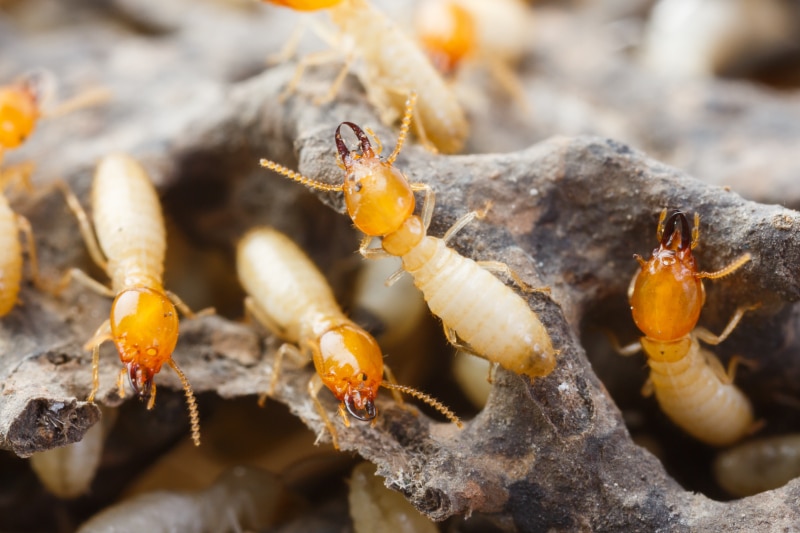Home / Blog / Termites / DIY Vs. Professional Termite Treatment: When to Call the Pros
DIY Vs. Professional Termite Treatment: When to Call the Pros

Scientifically reviewed by Daniel Baldwin, BCE, CCFS, CP-FS
-Published on June 6, 2023
-Updated on July 21, 2023
When you spot the signs of a termite infestation, you need to take immediate action to prevent major damage to your home or property. What might not be as clear is what to do exactly. Should you start researching the best termite treatment do-it-yourself solutions online or call the professionals? In this post, we’ll share the facts about termites and the truth about do-it-yourself termite treatment so that you can make the right decision.
What are termites?
Termites are insects that feed off the cellulose found in wood. There are more than 2,600 species of termites found globally. The U.S. has three main types: drywood, dampwood, and subterranean.
Drywood and dampwood termites live in trees and wooden structures. As their names suggest, drywood termites feed on cellulose found in dry wood, while dampwood termites prefer wood softened and damaged by water.
Subterranean termites live underground and eat wood in contact with the ground. They may reside in fallen trees, tree stumps, and structural lumber on the ground floors of homes.
Signs of a termite infestation
Every year, termites do billions of dollars worth of damage to property in the U.S. Fortunately, early identification of the warning signs can limit the destruction the pests can cause. If you spot any of the following, you may have a termite infestation:
- Peeling paint
- Loose tiles
- Pin-sized holes that resemble the ones left behind by thumbtacks
- Wood produces a hollow sound when tapped
- Changes in drywall, like discoloration or drooping
- Hardwood and laminate floors buckle or squeak
- Crumbling wood
- Sudden difficulty opening windows and doors
- Mounds of grainy pellets that look similar to salt and pepper
- Pencil-thin tubes of mud around your home
- Wings that resemble flower petals scattered outdoors
- Swirling, irregular patterns in wood created as termites feed
How effective are DIY termite treatments?
A quick Internet search can give you a wide variety of DIY termite treatment ideas. You may read about do-it-yourself orange oil termite treatment or home remedies for termites that involve scattering sodium borate or diatomaceous earth around areas where you suspect termites may be living.
While there is no shortage of homemade termite killer recipes out there, what is lacking is scientific research into their effectiveness. Anecdotal evidence in the form of stories of people who used home remedies to get rid of termites and saw results may be encouraging, but it’s not proof that they’ll work for everyone.
Benefits of professional home termite treatment
So can you effectively treat termites yourself? It’s unlikely that you can completely handle termite treatment at home all on your own. Here are some of the reasons why the services of licensed pest control technicians win out when you compare DIY termite control vs. professional services.
Inspections
Before developing a treatment plan, pest control technicians will thoroughly inspect your home, any outbuildings you have, and your property. They’ll work to locate termites and potential problem areas. In addition, they’ll identify the species of termites and tailor the treatment plan specifically to it.
With do-it-yourself termite control, you may miss smaller secondary infestations that will pose problems in the future. In addition, you may not know which type of termites you’re dealing with, making it difficult to choose the right DIY solutions.
Proven products and tools
As previously mentioned, home remedies for termites aren’t scientifically proven, but the products and tools that pest control technicians use are. If you try a DIY solution that doesn’t work, you’ll need to research and choose something else or call professionals. In the meantime, the termites have continued to feed, meaning you may have more damage to deal with.
Safety
Professional pest control technicians hold licenses to perform termite treatments. They know how to safely employ the products and tools at their disposal to address infestations.
Some DIY termite killer products contain ingredients that can harm people and pets. To use them safely, you may need to invest in personal protective equipment and follow complicated instructions. Calling in the pros allows you to avoid the risk entirely.
Emphasis on prevention
Even if you successfully manage an infestation with a DIY termite control remedy, the pests may come back in the future, especially if you don’t take steps to make your home and property less attractive to them. You may find yourself in an ongoing battle with termites, having to self-treat and watch for warning signs that the pests have returned.
Professional pest control technicians don’t just focus on the immediate problem. In addition to addressing the existing infestation, they seek out the things that attracted the pests in the first place and point them out to you, so you can make positive changes to protect your home. The pros can create a maintenance schedule if you live where termite outbreaks are common. This way, they’ll be the ones to monitor your home and take action if termites reoccur.
When should I call a pest control service for professional termite treatment?
It’s never too soon to call a pest control service. Even if you’re unsure if you have an infestation, contact the professionals as quickly as possible so that you can catch the problem early—termites can do major damage fast.
You don’t even need to wait until you spot the warning signs of termites to get help from the pros. If other people in your neighborhood have termite issues, pest control technicians can conduct an inspection, assess your risk, and recommend preventative treatments that lower the likelihood of infestations.
Pest control services
Whether you have an active termite infestation or want to take steps to protect your home before problems occur, Hawx Pest Control is ready to assist you. Our licensed pest control technicians have extensive knowledge about termite control and state-of-the-art technologies they can use to treat your home. We can put together a treatment plan for termite control or prevention tailored to your property’s specific needs and share tips on what you can do to make your home less vulnerable and appealing to termites.
Related Articles
Visit our blog to learn more.
→





